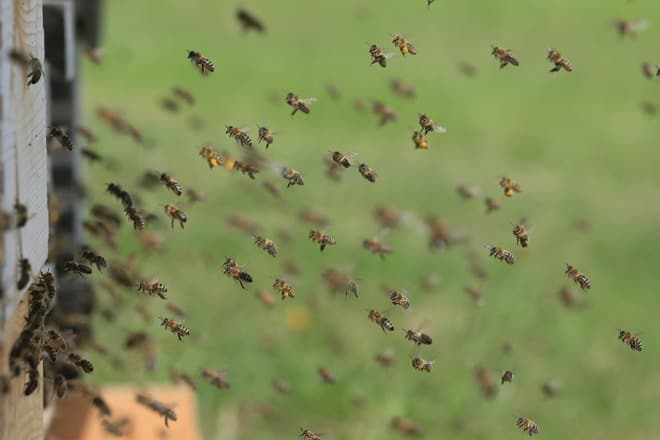Last Updated: 16 April 2025
Just like the mosquito in Jurassic Park, the earliest recorded honeybee was also found encased in amber. It was found in Myanmar and has been dated as being over 100 million years old.
Today there are approximately 20,000 species of bee. Despite popular belief, most bees live in solitary existence. For example, bumblebees live in burrows in the ground.
Before beekeeping and bee suits, getting honey from bees was a painful experience. Today it can be both an intensive and meditative job to take on.
But how do you get started?
Beekeeping for beginners requires following the right steps and understanding the benefits. Keep reading to learn 7 of those beekeeping benefits.
Table of Contents
Beekeeping for Beginners – The 7 Main Benefits
1. The Honey, Honey!
Most beekeepers decide to be beekeepers because of this tasty nectar. And we know it’s an obvious benefit, but had to mention it anyway because it’s the most delicious one.
Honey also has several health benefits. Aside from giving you a boost of energy when you eat it, it also has antiviral, antibacterial, and antifungal properties. It has been known to help fight a number of ailments like intestinal disorders, insomnia, hormone imbalances, and autoimmune conditions.
Honey also helps the body absorb calcium and calcium is a necessary mineral for brain health.
2. There Are Benefits in Bee Pollen
Did you know that it takes one working bee 8 hours to produce a teaspoon of bee pollen? And in that bee pollen, you’ll find almost every nutrient a human needs to survive. It contains more amino acids than eggs, beef, and cheese. Furthermore, it has more protein than any other animal source.
Raw bee pollen can be taken to fight off allergies to other blooming plants and flowers in a particular area. It has also been used to aid a variety of health issues, from prostate health and skincare.
So let’s allow the worker bees to keep doing their job.
3. It’s Fascinating and Rewarding
Beekeeping is both a fascinating and comforting hobby or job to take on. Getting to care for and observe an entire colony is a rewarding experience that will teach you many things. You may feel an overwhelming sense of calm or more in tune with nature once you start beekeeping.
When you get to carefully remove that first tiny piece of honeycomb, dripping with honey, you’ll feel victorious.
4. You Can Train Your Bees
Honey Bees need a lot of water. As a rule of thumb, you can expect that each hive will need a gallon of water, per day. And you want to make sure that they get their water from a good, clean source. For instance, you don’t want them getting water from your neighbor’s chlorinated pool.
That being said, put their water source near the hive and scent it with something like almond or vanilla. Once you provide that source for them, those worker bees will always go back to it.
5. You Can Use Their Beeswax
Worker honey bees produce wax through special glands on their abdomen. The wax is formed into a honeycomb and becomes the structure of their home. Humans can also make use of this wax, without hurting the bees. You can learn how to make your own lip balm or candles. The possibilities are endless!
6. Your Garden and Greens Will Flourish
How to start beekeeping can be overwhelming, after all, you’ll need beekeeping equipment and you’ll be keeping bees.
But once you get the hang of it, it becomes unbelievably rewarding. It won’t just be your soul that flourishes, but your orchards, gardens, and plants alike.
Beekeeping and raising honey bees will ensure that the vegetation around your house flourishes. The yield of your fruits and vegetables will increase dramatically and flowers and plants will follow suit and be much more plentiful.
Those honeybees will also pollinate all around your property and even further, depending on the size. Either way, it helps the ecosystem remain sustainable and diverse.
And if you live in the city, without many plants around but are still determined to start beekeeping and learn all about beekeeping for dummies, take a look at our article all about urban beekeeping.
7. Keeping Your Own Hives Can Help Save the Bees
Because of pesticides and parasites, most of the native varieties of honey bees have been wiped out. Commercial beekeepers sometimes use cloning to keep their beehives full. These commercial hives are also more susceptible to attacks by mites and other parasites.
If you maintain a sustainable, holistic practice, your bees with grow strong immune systems that help them fight potential threats to their hives. Bees play an essential role in the food chain. Their pollination is what allows us to have fresh fruits and vegetables.
If you have your own bees, it will help your own garden and plants, but also the ecosystem all around you.
Some Other Things to Consider
If you want to know how to become a beekeeper, remember that it isn’t all fun and games. There is a lot of equipment that is needed to raise healthy and happy bees. That means there can be a fair amount of costs upfront, but once you have what you need, most of that equipment can last a long time.
Stings are inevitable, especially in the beginning. So make sure that you’re not one of those people who are fatally allergic to bees!
You might not get any honey in the first year. It takes time to learn the ins and outs and to get your bees to produce wax, raise young bees, and store honey for the winter. Just be patient and you’ll reach a point where you all reap the rewards.
Beekeeping for Beginners Takes Work but It’s Worth It
When it comes to beekeeping, the rewards definitely outweigh the risks. Beekeeping for beginners is a big job to take on, but like anything else, practice and learning from mistakes make perfect, so learn how to start beekeeping and how to start a beehive and then purchase the right beekeeping supplies.
Are you curious about how to make beekeeping into a business? Check out how to start your own bee farm here.

